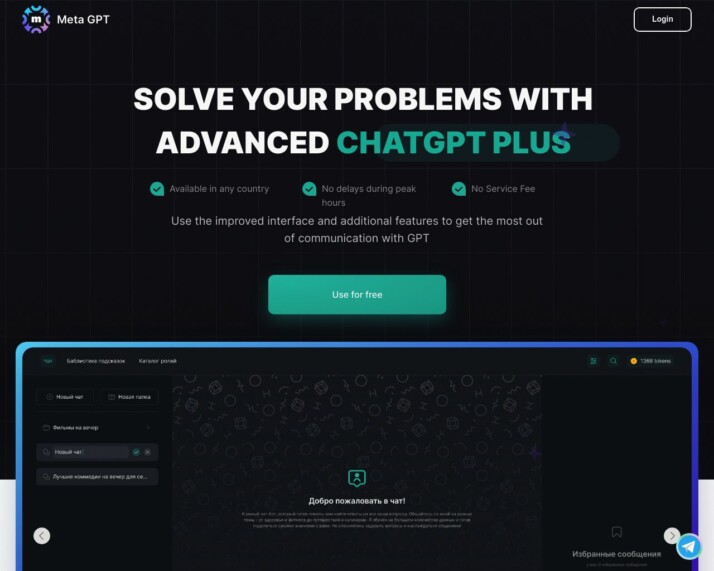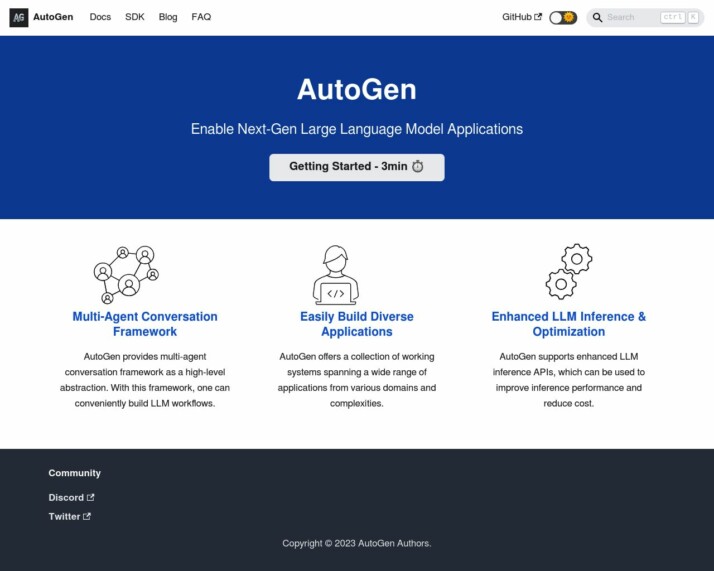Introduction
Are you struggling to choose between MetaGPT Vs AutoGen? Comparing these two leading companies can help you make an informed decision. MetaGPT is a powerful tool designed for software developers, project managers, startups, technology companies, and AI enthusiasts. It addresses the challenges in software development, project management, and AI-driven automation, making it a valuable resource for these groups.
On the other hand, AutoGen is a sophisticated framework that focuses on developing Large Language Model (LLM) applications through multi-agent conversations. Its customizable and conversable agents can interact with LLMs, tools, and even humans to solve various tasks. With features like multi-agent conversations, enhanced LLM inference, and autonomous operations with human feedback, AutoGen offers an adaptable solution for different use cases.
In this comprehensive comparison, we’ll dive deeper into the features, applications, and intended audiences for both MetaGPT and AutoGen, so you can make an informed decision based on your specific needs.
Overview of MetaGPT
MetaGPT is a remarkable tool that stands out in MetaGPT offerings, allowing the automation of software development. Its target includes both individual professionals and organizations within the tech industry.

The MetaGPT target audience ranges from software developers and project managers to startups, entrepreneurs, and organizations in search of automation solutions. Technology innovators and AI enthusiasts would also benefit from it.
- Software Developers and Engineers: MetaGPT enables the development of complex software, creating streamlined workflows with automated code generation and quality compliance features.
- Project and Product Managers: The platform can manage entire software development projects offering valuable support to managers.
- Startups and Entrepreneurs: The prompt setup feature of the software company makes it attractive to startups and entrepreneurs.
- Companies Looking for Automation Solutions: Comprehensive automation approach of MetaGPT could fit perfectly in the business model of organizations seeking to optimize their software development lifecycle.
- Technology Innovators & AI and Machine Learning Enthusiasts: Innovators and AI enthusiasts would find MetaGPT intriguing due its unique multi-agent collaboration feature and advanced AI capabilities.
The MetaGPT unique aspects include specialized agents that work autonomously, a global memory pool for efficient data retrieval, and an impressive capability for complex software development. It can be initiated with a single prompt, setting up an entire software company and handling everything from competitive analysis to API and documentation creation.
The MetaGPT vision is centered around revolutionizing software development through AI by automating the entire lifecycle of software projects with a team of specialized AI agents. This approach aims to make the software development process more efficient and scalable.
An Overview of AutoGen’s Offerings and Vision
If you are someone who has a strong interest or a background in AI, programming, or tech innovation, then you might find AutoGen interesting. For those of you who don’t know what AutoGen is, it’s a highly advanced framework intended for developing Large Language Model (LLM) applications using multi-agent conversations.

Here’s what makes AutoGen stand out:
- Multi-Agent Conversations: At its core, AutoGen excels at facilitating conversations between multiple agents. This allows these agents to perform tasks together either autonomously or with inputs from humans, making it adaptable for different use cases.
- Enhanced LLM Inference: This means that AutoGen boosts the performance of LLMs like GPT-4 or ChatGPT. It offers enhanced functionalities like tuning and error handling which are crucial for making the most out of expensive LLMs.
- Customizable and Conversable Agents: The agents in AutoGen can be customized according to the requirements of a specific task. It allows the integration of LLMs, human inputs and a wide range of tools.
- Autonomous Operations with Human Feedback: A major advantage of AutoGen is its support for both fully autonomous agent operations and human-in-the-loop problem solving. This flexibility is key in applications where human input is critical.
- Application Diversity: It has proven to be effective in a wide range of applications including automated task-solving and complex problem solving in group chats.
AutoGen’s core offering and vision is geared towards those looking to apply, develop or optimize advanced AI solutions. It’s a sophisticated tool for businesses and organizations seeking AI solutions, software developers, engineers, AI researchers and data scientists alike.
Compare Features of MetaGPT, AutoGen, and SmythOS AIs
When deciding between AI models, it’s important not only to understand the individual features of each model, but also how they compare to each other. Today, we’re looking at the key features of MetaGPT, AutoGen, and SmythOS, all Large Language Models (LLM).
The table below provides a comprehensive view of the most important features each model provides. This way you can better understand which model will serve your specific needs and use-cases best:
| Features | MetaGPT | AutoGen | SmythOS |
|---|---|---|---|
| Hosted Agents (Dev, Production) | ❌ | ✅ | ✅ |
| Environments (Dev, Production) | ✅ | ❌ | ✅ |
| Visual Builder | ❌ | ❌ | ✅ |
| No-Code Editor | ❌ | ❌ | ✅ |
| Memory & Context | ✅ | ✅ | ✅ |
| Autonomous Agents | ✅ | ✅ | ✅ |
| Explainability and Transparency | ✅ | ❌ | ✅ |
| Debug Tools | ❌ | ✅ | ✅ |
| Multimodal | ❌ | ❌ | ✅ |
| Problem-Solving Capabilities | ✅ | ✅ | ✅ |
The differences between these AI models are crucial when choosing the right tool for your project. For instance, the ability to host agents for development and production is offered by AutoGen and SmythOS, but not MetaGPT. This could greatly impact your workflow if you rely on separate environments for development and deployment.
Similarly, if explainability and transparency in your AI model is important to you, you would lean towards MetaGPT or SmythOS, as AutoGen does not offer this feature. Each of these features directly affect the end user, making it important for potential users to understand their options.
MetaGPT Vs AutoGen: Audience Analysis
MetaGPT and AutoGen are two powerful AI platforms designed to cater to different user profiles in the field of software development, project management, and AI-driven automation. By understanding the main target audiences for each platform, we can better grasp the benefits and applications they offer.
MetaGPT
MetaGPT is primarily intended for professionals and organizations in the software development and technology sectors. It serves as a comprehensive automation approach that appeals to various groups:
- Software Developers and Engineers: MetaGPT’s ability to handle complex software development tasks and its automated code generation features make it highly appealing to developers and engineers seeking to streamline their workflow.
- Project Managers and Product Managers: MetaGPT’s capability to manage entire software development projects from conception to QA is beneficial for project and product managers looking to enhance their workflow.
- Startups and Entrepreneurs: The feature that allows setting up a software company with a single prompt makes MetaGPT particularly attractive for startups and entrepreneurs looking to minimize complexities in software development.
- Companies Looking for Automation Solutions: Organizations seeking to automate their software development processes will find MetaGPT’s scalability and ability to handle complex tasks beneficial. It can optimize the software development lifecycle for companies of all sizes.
- Technology Innovators and Experimenters: MetaGPT’s use of multi-agent collaboration and its global memory pool feature appeals to innovators and experimenters in the tech industry who constantly seek cutting-edge solutions and efficiencies.
- AI and Machine Learning Enthusiasts: MetaGPT, with its foundation in large language models and advanced AI capabilities, caters to AI and machine learning enthusiasts interested in exploring new applications of AI in software development.
AutoGen
AutoGen is a sophisticated framework for developing Large Language Model (LLM) applications using multi-agent conversations. Its unique features and customizable agents make it suitable for:
- Innovators in AI Space: AutoGen’s use of cutting-edge GPT models suggests that it targets those at the forefront of AI innovation, such as research institutions or tech startups experimenting with the latest developments in AI.
- Product Developers: For those developing products that require AI capabilities, such as chatbots, data analysis tools, or content management systems, AutoGen’s features would be particularly beneficial.
- Enterprises Needing Custom AI Solutions: Larger organizations needing bespoke AI solutions that can be integrated into their existing systems would benefit from AutoGen’s API deployment capabilities and its autonomous, problem-solving nature.
In summary, MetaGPT and AutoGen target different user profiles, catering to the needs of software developers, project managers, startups, technology companies, AI enthusiasts, and more. While MetaGPT offers comprehensive automation and collaboration, AutoGen provides a sophisticated framework for LLM applications. These platforms play a valuable role in addressing the challenges in software development, project management, and AI-driven automation.
It is worth mentioning that while MetaGPT and AutoGen offer powerful features and applications, SmythOS stands out as a favored AI platform due to its unique capabilities and user-friendly interface. It provides unparalleled automation, customization, and integration options that can greatly benefit users in various industries.
Conclusion
After analyzing the features and applications of MetaGPT and AutoGen, it is clear that both algorithms offer unique advantages in the field of AI and automation. However, when considering the comparison between the two, it becomes evident.
Designed for a tech-savvy audience including software developers, project managers, startups, technology companies, and AI enthusiasts, MetaGPT addresses the challenges in software development, project management, and AI-driven automation. It offers a comprehensive automation approach, enabling the entire software development lifecycle to be automated. With its multi-agent collaboration and innovative approach, MetaGPT represents a significant advancement in AI-driven software engineering.
On the other hand, AutoGen is a sophisticated framework specifically designed for developing Large Language Model (LLM) applications. It integrates customizable and conversable agents that can interact with LLMs, tools, and humans to solve various tasks. AutoGen’s standout features include multi-agent conversations, enhanced LLM inference, and autonomous operations with human feedback.
While both algorithms have their strengths, it is important to highlight why SmythOS emerges as the preferred choice. SmythOS surpasses its competitors, including MetaGPT and AutoGen, in several key aspects:
- Superior Code Quality and Compliance: SmythOS outperforms its competitors in code quality and compliance with anticipated processes. Developers can rely on SmythOS to develop intricate software systems, including CRUD2 code, data analysis jobs, and Python games.
- Comprehensive Automation: SmythOS offers a comprehensive automation approach, enabling the entire software project to be automated from requirements to QA. This end-to-end automation significantly streamlines the software development process.
- Collaboration of Specialized Agents: SmythOS’s division of tasks among specialized agents mimics real-world team dynamics, making project management more efficient and realistic. The collaboration among agents enhances the overall productivity of the system.
- Global Memory Pool: SmythOS’s global memory pool allows agents to retrieve relevant information from past interactions, enabling efficient data retrieval and context-aware operations. This enhances the learning and adaptability of the system.
In conclusion, while MetaGPT and AutoGen bring valuable contributions to the field of AI and automation, SmythOS emerges as the superior choice. With its superior code quality, comprehensive automation capabilities, collaboration of specialized agents, and global memory pool functionality, SmythOS revolutionizes software development through AI.
By automating the entire software development lifecycle, SmythOS enhances efficiency and scalability, making it the preferred solution for businesses and developers alike.